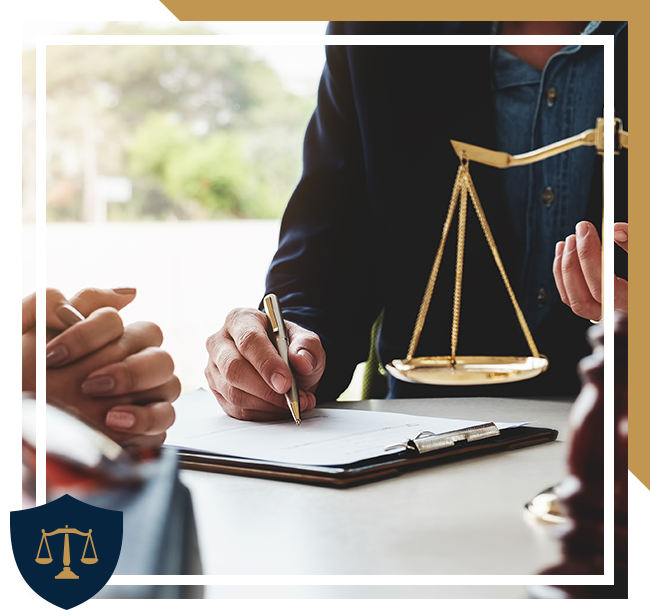
Nursing Home Abuse Lawyer in New Jersey
Strong Representation for Vulnerable People
A nursing home is a place where your elderly loved one can receive the care and attention they need — at least it should be. Sadly, not all nursing homes live up to the standards we expect of them. At worst, nursing home staff and administration can be negligent or even abusive, causing harm to vulnerable residents.
If your family has been impacted by the tragedy of nursing home abuse, you don’t have to accept what happened to your loved one. Negligent parties must be held accountable — and can be — through a legal claim. DeZao & DeZao, P.C. is committed to helping you understand your rights in this situation and fight for those rights.
Schedule a free consultation by calling (973) 358-6134 or filling out our contact form.
Types of Abuse
Regardless of the type of home and the specific population it serves, nursing home abuse accidents occur. These range from the relatively minor to the life-threatening.
Common types of abuse include:
- Physical nursing home abuse includes things like being restrained and staff using unnecessary force. It can also include negligence like failure to properly supervise residents, medication errors, delayed medical care, malnutrition, and dehydration.
- Emotional abuse includes things like yelling at residents, being unnecessarily aggressive or hostile, using overly controlling supervision strategies, and all forms of verbal abuse.
- Financial abuse includes stealing money, checks, debit cards, and credit cards from residents. In severe cases, abusers can even steal the identity of residents and use it to open new accounts or take out loans on their behalf.
- Sexual abuse includes unwanted touching or groping, sexual assault, rape, and taking sexual pictures or videos. Due to its nature, nursing home sexual abuse often includes other types of abuse, like physical and emotional abuse. This kind of abuse is also the hardest for residents to talk about and seek justice for.
How Do You Know If a Loved One Has Become a Victim?
Even though your loved ones trust you, they may be too embarrassed to tell you about what’s happening inside their assisted living facility. They could even be too confused to realize that they are being victimized in the first place, either because of medication, manipulation, or the effects of their underlying conditions. Therefore, it is important that you keep an eye open for the common signs and symptoms of abuse.
These include:
- Dehydration
- Malnutrition
- Extreme weight loss
- Bedsores
- Hair loss
- Gangrene
- Aspiration pneumonia
- Muscle cramps or contractions
- Depression or an unexplained change in demeanor
- Broken bones or other injuries caused by falling
- Suspicious injuries or bruises
- Suspicious or sudden death
What to Do if You Suspect that Your Loved One is Being Abused in a Nursing Home
To prevent further abuse from happening and to bring abusers to justice, early detection is essential. Here are 4 signs of nursing home abuse that people have to be keener about.
Physical abuse warning signs
Physical abuse is an intentional act of harming another person by means of bodily contact. It can include punching, pushing, shoving, biting, threats or assault, or the improper use of restraints. Victims of physical abuse are 300% more likely to die within the next 3 years, according to the Assisted Living Federation of America. Below are a few signs of physical abuse.
- Bruising, scarring, and other bed injuries that cannot be accounted for
- Unexplained broken bones or dislocation
- Unexplained marks on wrists (signs of being restrained)
- Damage of elder’s possessions such as broken glasses or bloody underclothing
- Questionable circumstances surrounding the death of an elder
Emotional abuse warning signs
Emotional abuse entails verbal and nonverbal acts that psychologically harm the victim. It includes both aggression, such as insulting, humiliating, or demeaning behavior towards the victim, as well as ignoring the victim, and isolating them. Here are a few signs of emotional abuse.
- Constant fear and aggression
- Depression, anxiety, and isolation
- Improbable reasons for injury and contradicting stories
- Withdrawal, disorientation, is wary about talking openly
- Observable change in disposition
Financial abuse warning signs
Financial abuse involves the illegal or improper use of the patient’s material assets. Generally, people closer to the patient commit this crime and one should be especially wary of those with power of attorney. A few signs of it are listed below.
- Unexplained withdrawal from the patient’s account
- Loss of elder’s valuable items
- Questionable change in legal documents such as policies and wills
- Unpaid bills
- Purchasing things that the elder does not need
- Other activities related to finances that the elder cannot possibly do such as signing a document or making an ATM withdrawal when the elder is physically incapable of doing so
Neglect warning signs
Nursing home abuse often comes with intent, but neglect is a breach of duty or substandard care. Abuse is easily noticeable, but neglect is often harder to detect. Negligence puts the patient at a higher risk of disease. To help you spot it more easily, please read the signs listed below.
- Dehydration
- Malnutrition
- Faulty medication
- Infection
- Unsanitary and unsafe living conditions
Apart from these four general groups of nursing home abuse warning signs, loved ones of elders living in these facilities can also observe how caregivers act around the elderly that they are supposed to take care of. Some of the red flags include outright refusal of caregivers for elders to speak to their visitors by themselves, general indifference to the elder’s needs, and implausible stories to explain certain injuries sustained by the elders.
If you have noticed any of the signs of nursing home abuse above, the care of your loved one is the most important thing. You should remove the victim from the abusive nursing home as soon as possible and get them any necessary medical care. It will be helpful to your case to gather any evidence you have available.
Once your loved one is safe, you should contact us to learn more about how you can hold the nursing home accountable and recover compensation for the harm that your family member has suffered. You have legal options — negligent caregivers and facility administrators must pay for what they did.
Below are agencies or organizations that you can contact just in case you have observed some of the above warning signs:
- The Adult Protective Services
- The National Eldercare Abuse Page
- The Primary Care Physician of the Elder
- 911
Who Can Sue a Nursing Home in New Jersey?
Subject to the facts and circumstances of the case, either the resident or their family can file a lawsuit against a nursing home. Depending on the resident’s mental state, the family may be able to allege medical malpractice or personal injury on the patient’s behalf.
In the event that a resident dies as a result of nursing home negligence, an attorney can help your family bring a wrongful death action to recover for monetary and emotional loss.
What Is the Statute of Limitations on Nursing Home Lawsuits in NJ?
In New Jersey, personal injury lawsuits (including most lawsuits for nursing home malpractice, abuse, or neglect) must be filed within two years of the date of the injury. The time limit is referred to as a “statute of limitations.” The failure to bring the lawsuit within the two-year period can forever bar you from seeking justice for your claim in the courts.
What Rights Do Nursing Home Residents Have?
Senior citizens of New Jersey are protected under state law through NJSA 30:13-5, also known as the Nursing Home Residents’ Bill of Rights. These include many rights, a few of them being the right to “manage [their] own financial affairs,” phone access, privacy, and managing their own treatment (including the hiring of a “personal physician at [their] own expense or under a health care plan” and the right to refuse medication).
Perhaps most pertinent to this subject is:
“The right to a safe and decent living environment and considerate and respectful care that recognizes the dignity and individuality of the resident, including the right to expect and receive appropriate assessment, management and treatment of pain as an integral component of that person’s care consistent with sound nursing and medical practices.”
If this right or any of the other rights listed under NJSA 30:13-5, then it is a violation of the law. Any resident who believes these rights have been violated, or their families, can absolutely take a nursing home to court and seek compensation.
Free Consultations
If you or a loved one has incurred injury, expense, or distress as a result of elder abuse or nursing home negligence, DeZao & DeZao, P.C. can help.
We take cases on a contingency fee basis, which means we don’t charge for our services unless we recover compensation for you or your family.
If you are interested in speaking with our New Jersey nursing home abuse attorney, contact us online or call (973) 358-6134 today.

Client Testimonials
Read What Clients Have to Say About Our Firm
-
"I will return in the future if I ever need legal assistance again!"Office overall were nice, but the best is Veronica. She’s amazing, dedicated, knowledgeable—she absolutely cares about her clients. Every time I had a question, she would answer or return all my calls right away. Very efficient and helpful from start to finish of my case. She’s great; I highly recommend her. I will return in the future if I ever need legal assistance again. Thank you very much.Frescia D.
-
"Guided me through the legal processes necessary to my case with clear and open communication!"Guided me through the legal processes necessary to my case with clear and open communication. My confidence never wavered with DeZao & DeZao.Brandon W.
-
"I can’t express how grateful we are to have had them by our side the entire time!"DeZao Law and their Associates helped my wife and I through a difficult time recently. From the very first call we made to them , right through to the very last detail of our case , they were responsive , helpful , thoughtful , extremely professional and always pleasant. They were available at all times and reached out to us often to check in and see how we were doing throughout the entire process. I can’t express how grateful we are to have had them by our side the entire time. They came through exactly as they had promised at the very beginning. We Absolutely recommend them to anyone who is in a situation where you’re not sure if you need representation or not. Give them a call. You will not regret it. Stellar review all around.Sean T.
-
"My experience with DeZao Law Firm was spectacularly positive!"My experience with DeZao Law Firm was spectacularly positive. I worked directly with Anthony DeZao, as well as with Megan McRoy. They both kept in touch with me every step of the way to let me know how the case was progressing. I trusted them with every decision that they made, and would recommend them without reservation for any additional legal help or guidance that I might need in the future.Barbara G.
-
"I would be more than happy to recommend them!"I was referred to this firm by my husband and I could not be more thankful that he sent me to this office because the service was perfect. Valentina guided me throughout. I had a car accident and it was a very stressful time in my life. Valentina kept me calm and at ease during all this, and everyone else are very professional too. They were very compassionate and I could tell that they genuinely and truly wanted to help me and fight for me. I recommend them, actually I would be more than happy to recommend them. I know my family will recommend this office as well. They also helped out my husband’s son with his car accident and did a fantastic job for him too! Thanks for everything!Carmen D.
-
"They went out of their way to keep me informed"I would like to take this opportunity to thank The Law Offices of DeZao & DeZao for helping me with my legal needs. Especially attorney Margaret Meade and Valentina Failla, Paralegal/Case Manager. They were both instrumental in getting my matter resolved. They went out of their way to keep me informed and on top of al my legal needs. They both truly made this a wonderful experience.Jerry D.
-
"I can't say enough about this Office!"I can't say enough about this office. It is absolutely amazing. They were quick, efficient and took care of all of my needs, and explained every detail as I went through this process. Yessica was absolutely amazing! She was professional and helpful. I'm so glad I chose this office!Crystal P.
-
"This firm made me feel at ease"I had a motor vehicle accident and this firm has been so patient with me throughout the 3 years of my case. Valentina and Rachel have really been a lot of help. They talked me through everything and helped me understand what was going on. I've had accidents before but nothing like this. My car was totaled. It was scary and DeZao & DeZao made made me feel at ease. They always got back to me. I am very satisfied with the outcome of my case and the services this office gave me. Also I LOVE their pens!Carol R.


Successful Results
Millions Recovered in Verdicts & Settlements
-
$2,000,000 Work Accident Case
-
$3,100,000 Motor vehicle Accident
-
$3,000,000 Bus Accident
-
$8,000,000 Motor Vehicle Accident
-
$2,000,000 Bus Accident


The Right Attorneys. Right Now.
What Sets Us Apart?
-
A Multi-Generational Legacy of Success
-
Hundreds of Millions Recovered For Our Clients
-
Personalized Attention & Curated Legal Plans
-
Committed & Passionate Advocacy
-
Always Available & Accessible To Our Clients
-
Capable of Handling a Wide Variety of Case Types